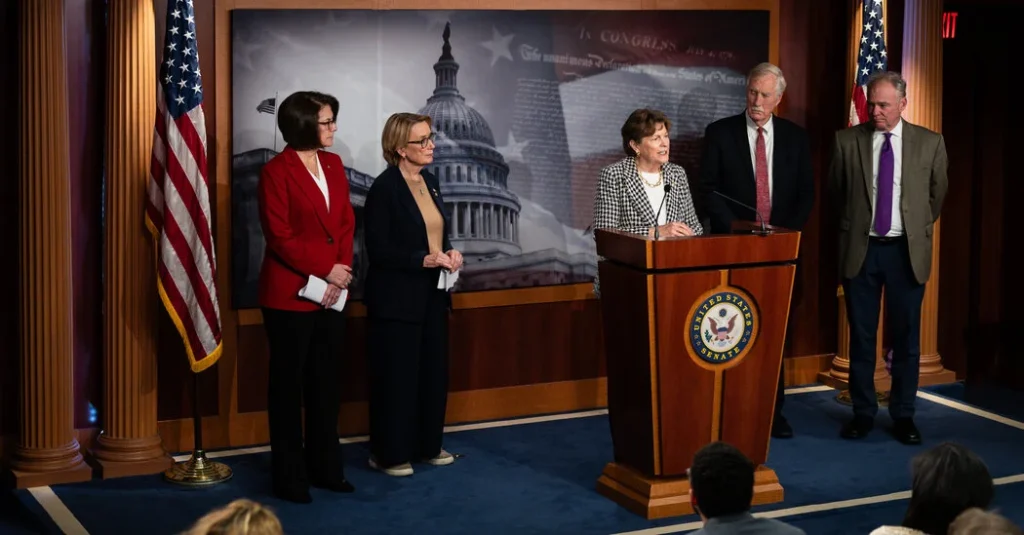A weekend agreement struck to conclude the longest government shutdown in United States history has caused a deep schism among Senate Democrats.
The party’s vocal progressive wing directed harsh criticism toward Senate Minority Leader Chuck Schumer for the second time this year.
Leadership Under Fire
Mr. Schumer and his Democratic colleagues had initiated the government shutdown. Their goal was to pressure opponents into preventing the expiration of health insurance subsidies, which benefit 24 million Americans.
This high-stakes move followed an incident in March where the New York lawmaker drew internal outrage for agreeing to a prior shutdown-averting deal.
Mr. Schumer personally held the line, voting against the measure on Sunday. However, eight members of his caucus broke ranks.
These eight votes provided enough support to advance the measure toward reopening federal operations. The split provoked renewed criticism of the 74-year-old leader’s strategy.
“Leadership is about changing and adapting when there is real need, and unless we hear that, we will fail to meet the moment,” stated first-term Senator Elissa Slotkin of Michigan.
Progressive groups adopted a much stronger stance. The advocacy group “Our Revolution” demanded Mr. Schumer resign as minority leader. Representative Ro Khanna of California echoed this sentiment, stating: “Senator Schumer is no longer effective and should be replaced.”
California Governor Gavin Newsom, seen as a potential contender for the 2028 presidential nomination, called the compromise “Pathetic. This isn’t a deal. It’s surrender” on social media.
Post-Election Blowback
The internal conflict emerged less than a week after the party celebrated several electoral successes. Last Tuesday saw moderate Democrats win dominant victories for governor in New Jersey and Virginia. Furthermore, a democratic socialist was elected as Mayor of New York City.
The controversy reflects the frustration felt by a party largely sidelined in Washington, where Republicans control both the House of Representatives and the Senate.
In a speech to the Senate on Monday, Mr. Schumer defended the party’s efforts, saying Democrats succeeded in keeping healthcare issues “at the forefront of people’s minds.” He added, “The American people will not forget Donald Trump’s cruelty and heartlessness over the past six weeks.”
Criticisms and Defense of Strategy
For months, Democrats had been fighting to prevent sharp increases in health insurance premiums due to the December 31 expiration of an Affordable Care Act subsidy.
Congressional Democrats had insisted they would not allow a funding bill to pass until demands for renewing the subsidy were met.
“Caving on a deal that doesn’t fix health care is, and always has been, a giant betrayal of the American people,” criticized former Congressional Progressive Caucus Chair Pramila Jayapal of Washington State.
Centrist figures predicted the intense progressive criticism would likely fade. Jon Cowan, president of the think tank Third Way, suggested in an interview that every Democrat and allied group would soon stop the “circular firing squad” and focus their opposition solely on President Trump and vulnerable congressional Republicans in upcoming elections.
Some Senate colleagues of Mr. Schumer attempted to redirect the anger toward the President. Senator Jeff Merkley of Oregon called the vote to proceed with reopening the government, a multi-day process a “brutal blow.” He insisted, “The real villain is Trump and congressional Republicans.”
Fractured Leadership
The pressure for older party leaders to step aside has been building for years, driven by a desire for new faces. This sentiment gained steam after concerns about the age of former President Joe Biden contributed to the party’s losses in the 2024 election.
Former House Speaker Nancy Pelosi stepped down from her leadership role in 2022 and later announced she would not seek re-election.
The vote demonstrated a clear fracture: notably, six of the eight Democrats who voted to end the shutdown are not seeking re-election next year, and two are retiring, including the No. 2 Senate Democrat, Dick Durbin.
Senator Durbin confirmed he voted to end the shutdown despite Mr. Schumer’s disappointment. “He was a gentleman about it, though he disagreed with me,” Durbin told reporters.
“I think our friendship is still intact.” Even some party moderates criticized the deal. New Jersey Governor-elect Mikie Sherrill called the compromise “malpractice,” arguing voters demanded “leadership with a backbone.”




















